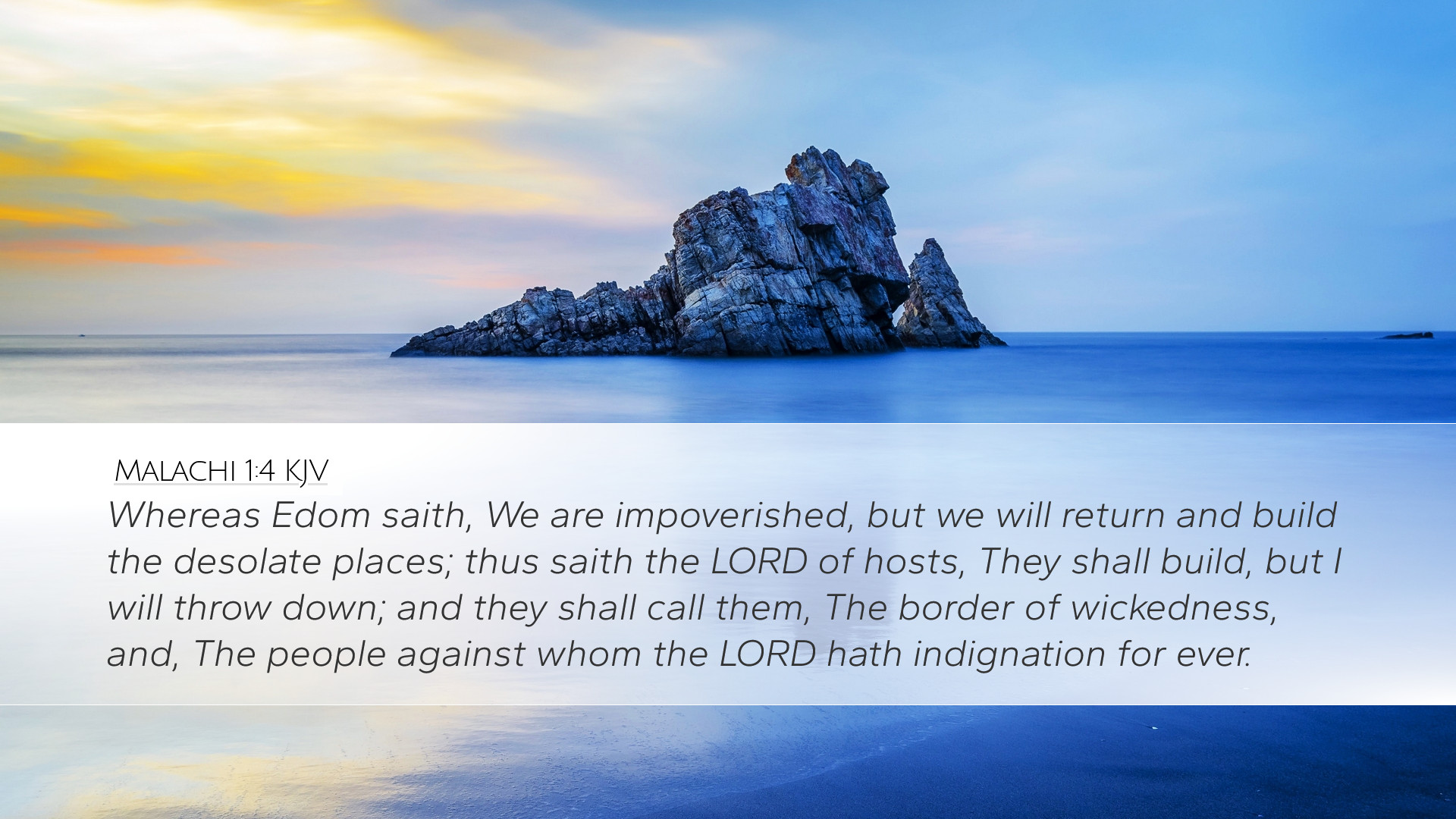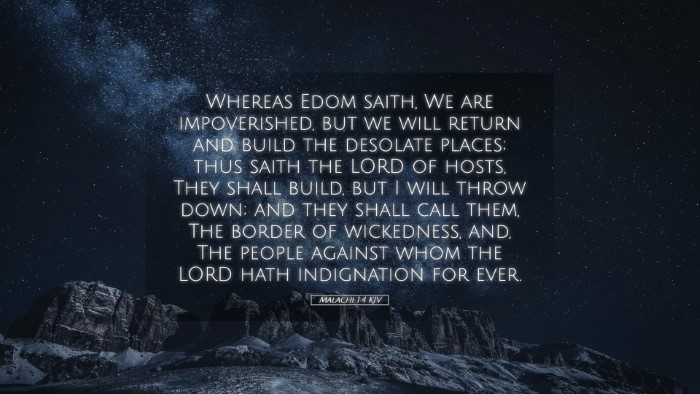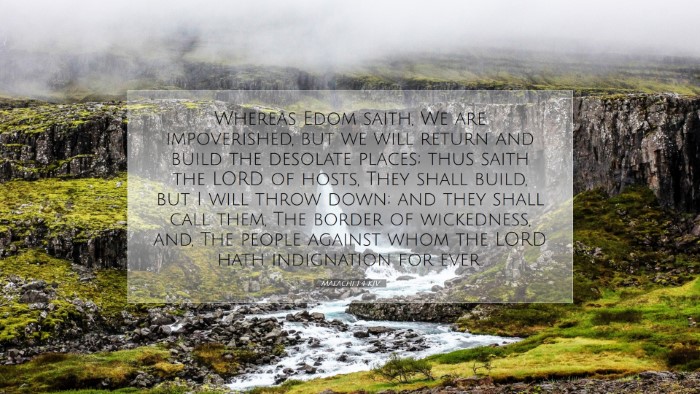Old Testament
Genesis Exodus Leviticus Numbers Deuteronomy Joshua Judges Ruth 1 Samuel 2 Samuel 1 Kings 2 Kings 1 Chronicles 2 Chronicles Ezra Nehemiah Esther Job Psalms Proverbs Ecclesiastes Song of Solomon Isaiah Jeremiah Lamentations Ezekiel Daniel Hosea Joel Amos Obadiah Jonah Micah Nahum Habakkuk Zephaniah Haggai Zechariah MalachiMalachi 1:4
Malachi 1:4 KJV
Whereas Edom saith, We are impoverished, but we will return and build the desolate places; thus saith the LORD of hosts, They shall build, but I will throw down; and they shall call them, The border of wickedness, and, The people against whom the LORD hath indignation for ever.
Malachi 1:4 Bible Commentary
Commentary on Malachi 1:4
Verse: Malachi 1:4 - "Whereas Edom saith, We are impoverished, but we will return and build the desolate places; thus saith the Lord of hosts, They shall build, but I will throw down; and they shall call them, The border of wickedness, and, The people against whom the Lord hath indignation for ever."
Contextual Background
The book of Malachi serves as a prophetic warning to the people of Israel after their return from Babylonian exile. In this context, the prophet addresses issues of lax worship, unfaithfulness, and the broader implications of God’s covenant with Israel. Malachi 1:4 specifically focuses on the nation of Edom, which, as descendants of Esau, represents a historical nemesis of Israel.
Insights from Commentaries
Matthew Henry's Commentary
Matthew Henry elaborates on the condemnation of Edom as a representation of pride and rebellion against God. He emphasizes that while Edom may declare intentions to rebuild, the Lord’s sovereign declaration carries finality. Henry notes that God’s response signifies that all efforts of Edom to restore themselves will ultimately fail because they persist in opposition to divine decrees. The phrase "border of wickedness" suggests not just a geographical designation, but a spiritual and moral state that warrants God's judgment.
Albert Barnes' Commentary
Albert Barnes provides a historical perspective on Edom’s situation. He outlines that Edom’s claim of poverty and desire to rebuild is an affront to God’s judgment. Barnes connects this with the prophetic nature of Malachi's message, stating that God’s judgment is not only against the physical actions of nations but against their hearts. The promise that Edom will be called "the people against whom the Lord hath indignation for ever," underscores a divine decree that is not temporary but eternal. Barnes also emphasizes the theological principle that God's enemies cannot succeed despite their apparent strength or resolve.
Adam Clarke's Commentary
Adam Clarke interprets Malachi's mention of Edom as a reminder of the futility of human efforts when opposed to God's plans. Clarke highlights the contrast between Edom’s aspirations and God’s sovereign decision to thwart them. He notes that the Edomites, although they declare, "We will return and build," are ultimately blind to the implications of their rebellion. Clarke discusses how God’s judgment against Edom serves as a foil to Israel’s experience—while Israel may face divine discipline, Edom’s fate is one of ongoing rejection. This serves as an admonition to all nations regarding the sovereignty of God over human affairs.
Theological Implications
This verse profoundly speaks about the nature of God’s sovereignty and justice. It warns against presumption and self-reliance apart from divine favor. For modern readers—especially pastors and theologians—Malachi’s message is a reminder of the consequences of national and individual sin, and the necessity of repentance and humility before a holy God. The reference to Edom serves as a stark counterpoint to God’s love for Israel, suggesting that divine mercy is not an entitlement but a privilege that should not be taken lightly.
Application for Contemporary Believers
In our contemporary context, believers are called to reflect on their own spiritual states in light of God’s sovereignty. The challenges and adversities faced should not lead to despair or rebellion, but rather, draw us closer to God. The passage prompts an evaluation of our intentions as we seek to "build" in our lives. Are we building on the foundation of faith and obedience, or are our efforts akin to Edom’s, defiant in nature? This reflection can serve as a powerful catalyst for revival.
Conclusion
Malachi 1:4 stands as a clarion call for recognition of God's authority and a reminder that human pride often leads to downfall. The insights drawn from historical commentaries illuminate the timeless relevance of this scripture for today’s readers. It challenges us to align our lives with God’s purposes, embracing humility, and seeking His grace to avoid the fate of Edom.


